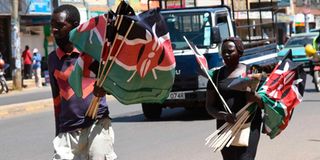How to transform Kenya into a strong multi-ethnic nation-state

Traders sell Kenyan flags in Eldoret town, Uasin Gishu County as the country celebrated Madaraka Day on June 01, 2021.
What you need to know:
- Kenya has 43 ethnic groups practising different cultures.
- At the personal level, most Kenyans tend to identify with the cultures of their ethnic communities.
The Constitution of Kenya 2010 recognises culture as the foundation of the nation and as the cumulative civilisation of the Kenyan people and nation. Article 11 affirms the value of culture and mandates the state to promote it through literature, arts, traditional celebrations and other forms of expression.
The Merriam-Webster dictionary defines culture as “the customary beliefs, social norms and material traits of racial, religious and social groups” and as “an integrated pattern of human knowledge, belief and behaviour that depends on the capacity for learning and transmitting knowledge to succeeding generations.”
It gives a people their unique identity and a basis for regulating human ties through norms, habits and practices. Kenya has 43 ethnic groups practising different cultures. At the personal level, most Kenyans tend to identify with the cultures of their ethnic communities.
This plays a key role in shaping political choices and explains our ethnically charged political contests, which tend to undermine the quest for a nation-state; that is, a state made up of people with a common identity.
Our ethnic identities
A nation-state is anchored on two key principles. First, the principle of state sovereignty, which recognises the right of states to govern their territories without external interference.
Second, the principle of national sovereignty, which recognises the right of communities in a nation to govern themselves.
To transform our dysfunctional political culture, we must accept there is nothing wrong with embracing our ethnic identities. This entails amplifying the positive elements of our rich cultural heritage by, for example, supporting integration of our traditional knowledge systems into the formal economy and protecting traditional intellectual property rights.
Second, promoting cultural values like respect, tolerance, love and peace as the building blocks for national cohesion for a less polarised political culture devoid of ethnic stereotyping, suspicion and hatred.
Third, promoting cultural institutions like the elders to build inter-ethnic and cross-cultural bridges in order to build a truly Kenyan nation-state.
Mr Choto is a legal and policy analyst; [email protected]





